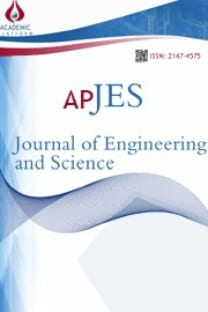Uyarlanabilir Çevrimiçi İngilizce Seviye Tespit Sınavı ile Türkiye’deki İngilizce Seviyesinin Analizi
Analysis of English Level in Turkey with Adaptive Online English Proficiency Exam
___
[1] M. Saville-Troike and K. Barto, Introducing second language acquisition. Cambridge University Press, 2016.[2] A. Insight, “The 2015-2020 Worldwide Digital English Language Learning Market,” 2016.
[3] H. Aydoğan and A. A. Akbarov, “The Four Basic Language Skills, Whole Language & Intergrated Skill Approach in Mainstream University Classrooms in Turkey,” Mediterr. J. Soc. Sci., May 2014, doi: 10.5901/mjss.2014.v5n9p672.
[4] A. Pardo, “Designing Learning Analytics Experiences,” in Learning Analytics, New York, NY: Springer New York, 2014, pp. 15–38.
[5] M. Gusev and G. Armenski, “E-Assessment Systems and Online Learning with Adaptive Testing,” 2014, pp. 229–249.
[6] H.-K. Wu, C.-Y. Kuo, T.-H. Jen, and Y.-S. Hsu, “What makes an item more difficult? Effects of modality and type of visual information in a computer-based assessment of scientific inquiry abilities,” Comput. Educ., vol. 85, pp. 35–48, Jul. 2015, doi: 10.1016/j.compedu.2015.01.007.
[7] B. V. Koen, “Creating a Sense of ‘Presence’ in a Web-Based PSI Course: The Search for Mark Hopkins’ Log in a Digital World,” IEEE Trans. Educ., vol. 48, no. 4, pp. 599–604, Nov. 2005, doi: 10.1109/TE.2005.850712.
[8] M. H. R. Nakayama, “The Impact of Learner Characteristics on Learning Performance in Hybrid Courses among Japanese Students.,” Electron. J. e-Learning, vol. 5, no. 3, pp. 195–206, 2007.
[9] F. Karahan, “Language attitudes of Turkish students towards the English language and its use in Turkish context,” Cankaya Univ. J. Arts Sci., vol. 1, no. 7, pp. 73– 87, Aug. 2007.
[10] T.-C. Hsieh, T.-I. Wang, C.-Y. Su, and M.-C. Lee, “A Fuzzy Logic-based Personalized Learning System for Supporting Adaptive English Learning,” J. Educ. Technol. Soc., vol. 15, no. 1, pp. 273–288, 2012.
[11] C. Troussas, K. Chrysafiadi, and M. Virvou, “An intelligent adaptive fuzzy-based inference system for computer-assisted language learning,” Expert Syst. Appl., vol. 127, pp. 85–96, Aug. 2019, doi: 10.1016/j.eswa.2019.03.003.
[12] Y. Wang, M.-H. Tseng, and H.-C. Liao, “Data mining for adaptive learning sequence in English language instruction,” Expert Syst. Appl., vol. 36, no. 4, pp. 7681– 7686, May 2009, doi: 10.1016/j.eswa.2008.09.008.
[13] P. Brusilovsky and E. Millán, “User Models for Adaptive Hypermedia and Adaptive Educational Systems,” in The Adaptive Web, Berlin, Heidelberg: Springer Berlin Heidelberg, pp. 3–53.
[14] P. Brusilovsky, “From Adaptive Hypermedia to the Adaptive Web,” 2003, pp. 21–24.
[15] “Anki.” [Online]. Available: https://apps.ankiweb.net/.
[16] J. YANG and J. PARK, “Software Review: SuperMemo UX-Extreme English Advanced and Proficient,” CALICO J., vol. 29, no. 4, pp. 718–726, 2012.
[17] B. McLaren, “Adaptive Online Learning The Present and Future of Education,” Wiley, 2013.
[18] “Dualingo.” [Online]. Available: https://tr.duolingo.com/. [Accessed: 27-Jan-2020].
- ISSN: 2147-4575
- Yayın Aralığı: Yılda 3 Sayı
- Başlangıç: 2013
- Yayıncı: Akademik Perspektif Derneği
M. Fatih ADAK, Mustafa AKPINAR, Ali UZUNYOLCU
Numerical Analysis of Heat Transfer of a Brazed Plate Heat Exchanger
LTE Ağlarda Remote-Host ile PG-W Arasındaki Kuyruk Yönetim Algoritmalarının Performans Analizi
Muhammet ÇAKMAK, Zafer ALBAYRAK
Yapım Firmalarının Kurumsal Risk Yönetimi Olgunluğunda Risk Yöneticisinin Rolü
Ferzan KATIRCIOĞLU, Zafer CİNGİZ, Yusuf ÇAY, ALİ ETEM GÜREL, SUAT SARIDEMİR, Ahmet KOLİP
Termal Sprey Yöntemi İle Paslanmaz Çeliklerin Yüzey Özelliklerinin Geliştirilmesi
Yıldız Yaralı ÖZBEK, Adalet BOZKAN
TIG Kaynak Yöntemiyle Birleştirilmiş Alüminyum 1050 Alaşımının Mekanik Ve Mikroyapı Özellikleri
Arife Kübra DEMİRBAŞ, Sinem ÇEVİK
İ smail İsa ATABEY, Serhat ÇELİKTEN, Ümit YURT
Atıksudan Fotokatalitik Yöntemle Boya Giderimi Ve Mineralizasyonu
